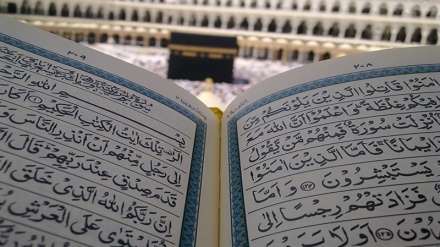Path towards Enlightenment (1008)
Welcome to our weekly episode of “Path towards Enlightenment”, which is an endeavour to make you and us familiar with an easy and fluent explanation of God’s Final Scripture to all mankind, the holy Qur’an that was revealed to the Last and Greatest of all Messengers, Prophet Muhammad (Blessings of God upon him and his progeny).
Last week we started explanation of “Surah Jumu’ah”, which has 11 Ayahs, and today we will complete it. Revealed in Medina, it opens with the glorification of Allah and the Prophet’s call. It enjoins believers to proceed to the ritual congregational prayer on Fridays by quitting all commercial transactions on hearing the Azaan or the call to Prayer. It says Muslims are not supposed to be like the Jews to whom God granted the Torah but they failed to act upon it.
Here we invite you to listen to Ayahs 6, 7, and 8:
“Say (O’ Prophet), ‘O you who are Jews! If you claim that you are Allah’s favourites, to the exclusion of other people then long for death, should you be truthful.’
“Yet they (the Jews) will never long for it, because of what their hands have sent ahead, and Allah knows best the wrongdoers.
“Say (O’ Prophet to the Jews): ‘Indeed the death that you flee from will surely encounter you; then you will be returned to the Knower of the Seen and the Unseen, and He will inform you about what you used to do.”
If you remember, last Friday in our explanation of the previous Ayahs of this Surah, we said the mission of the Prophet of Islam is not exclusive to the Arabs or the people of his time; but it is for all humanity, including people of all ethnicities and of every place on Planet Earth. We also said that the Jewish tribes in Medina used to mock at Islam and became deserving of censure for violating the tenets of the Torah, which gives the tidings of Prophet Moses of the universal mission of Prophet Muhammad (blessings of God upon him and his progeny).
The Ayahs that we recited to you now challenge the claim of the Jews to be the chosen people of God and tells them to desire death for themselves if they are truthful. In other words, if they are true in their claims to be the intimate friend, why are they engrossed in the mundane life and are fearful of death?
The fact of the matter is that the Israelites had long deviated from the teachings of the Torah and distorted its contents by disobeying the Prophets that came after Moses, especially Jesus and the Prophet of Islam.
Ayah 7 says the main cause of their fear of death is their record of sins, which prevent them from yearning for death. The point is that a person fears death because of two reasons. Firstly, the lack of belief in the Hereafter, which makes death appear as a monster ending existence and the pleasures of life. Secondly, despite belief in the Hereafter, it is the fear of punishment in afterlife that makes the sinner terrified of death.
The next Ayah commands the Prophet of Islam to tell the Jews that entertaining such anxiety and fear may not solve any problems, since death is in store for all human beings. The law of death is one of the most general and all-encompassing laws that ends the existence of all created things, whether animate of inanimate, including Prophets, angels, mountains and seas. Thus, no person can escape death and resurrection for the trial in the Divine Court on the Day of Judgement on which the All-Merciful Creator Who is aware of all and everything, including the visible and the invisible, will mete out justice.
Compare and contrast this fear of death of the Jews with the readiness for death of the virtuous and spotlessly pure Muslims who smilingly court martyrdom. The most glaring example in this regard is the Prophet’s Vicegerent, Imam Ali ibn Abi Taleb (AS), who risked his life at every turn to save Islam – from the night of migration when the pagans hovered around the Prophet’s house with naked swords to every battle imposed by the Arabs and the Israelites. He used to say he was “more familiar with death than an infant with the breast of its mother.” When struck the fatal sword blow on his head, which resulted in his martyrdom Imam Ali (AS) famously remarked, “I have succeeded, by the Lord of the Ka’ba.”
From these Ayahs we learn that:
- Readiness for death is the best means for evaluating the faith of those who claim to be the chosen persons of God.
- It is a cardinal sin to consider oneself or a community to be the favourites of God, or even the children of God, since the Almighty Creator is far glorious and free of having any needs and the characteristics of His creatures.
- Fear of death has its roots in evil deeds, and thus in contrast to the sinners and disbelievers, the pious and righteous people fearlessly court martyrdom.
Now let us listen to ayahs 9 and 10 of the same Surah:
“O’ you who have faith! On the call for prayer on Friday, hurry toward the remembrance of Allah and leave all business. That is better for you, should you know.
“And when the prayer is finished disperse through the land and seek Allah’s grace, and remember Allah greatly so that you may be felicitous.
Among the days of the week, Friday is of particular significance. It is the day of providing more help to the deprived and the poor. A famous narration from the Prophet reads: “On Friday, God Almighty renders good deeds many folds and effaces evil deeds and promotes the ranks of the believers, wards off afflictions, and answers the prayers of the believers. Whoever visits the tomb of his parents or either of them, his/her sins shall be forgiven and his/her name recorded among the righteous.”
Moreover, it will be Friday, when the Lord of the Age, the Prophet’s Last and Twelfth Heir, Imam Mahdi (AS), will reappear in the end times to establish the global government of peace, prosperity, and justice.
Ayah 9 thus refers to significance of the special Friday congregational prayer at noon and its laws, which stipulate the leaving of business and other activities at that particular time in order to participate in this act of worship, which has many benefits. It is noteworthy that leaving off trade encompasses any activity interfering with the remembrance of God Almighty.
The next Ayah means to say that worldly possessions are Divine Bounties, and after completion of the Friday Prayer, the believers can return to their trade and other lawful activities. The faithful ought to invoke the Almighty for bestowing His Bounties and be in remembrance of Him at all times in order to avoid aimlessness and wrongdoing.
These Ayahs teach us the following points:
- Participation in the Friday Prayer and other congregational prayers is a sign of faith.
- No activity should prevent a believer from keeping away from the Friday Prayer, and thus on this day, especially at noontime, markets are closed.
- The congregation Prayer is a sign of the unity and strength of the believers, who are free to continue their business and other lawful activities after participating in this significant act of worship.
With recitation of the 11th and last Ayah of Surah Jumu’ah we come to the conclusion of this week’s episode of “Path towards Enlightenment”:
“When they see a deal or diversion, they scatter off towards it and leave you (O Prophet) standing! Say, ‘What is with Allah is better than diversion and dealing, and Allah is the Best of providers.”
Once, when the Prophet of Islam was delivering the sermons of the Friday Prayer a trade caravan entered Medina beating its drums. Some of the Muslims left the congregation and hastened towards the merchandize ignoring the Prophet’s sermons.
At this point, to censure their unworthy act, God Almighty revealed this Ayah in order to make it known to Muslims that turning their backs on speech and admonishments of the Divinely-Decreed Leader is highly disrespectful and act of disobedience toward God. It is God Who created us and provides us sustenance. Therefore, we should not neglect worship and rituals by engaging in trade and amusement as these times.
It is narrated from the Prophet that the one who participates in the Friday Prayer with faith, his/her sins will be forgiven and he/she will proceed with a new life. . From this Ayah we learn that:
- Observance of the Friday Prayer guarantees happiness in both this world and the Hereafter.
- We should not involve ourselves in trade and other activities at the time of the Friday Prayer.
AS/ME


